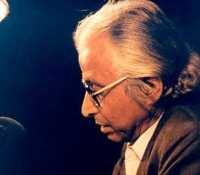Sanjib Chattopadhyay
Sanjib Chattopadhyay (Bengali: সঞ্জীব চট্ট্যোপাধ্যায়) (born 24 October 1936 [1]in Kolkata, India) is a Bengali novelist and writer of short stories.[1] His style is characterized by use of short satirical sentences mixed with very lively language.
Sanjib Chattopadhyay সঞ্জীব চট্টোপাধ্যায় (in Bengali) | |
|---|---|
 Sanjib Chattopadhyay | |
| Native name | সঞ্জীব চট্টোপাধ্যায় (in Bengali) |
| Born | 24 October 1936 [1] |
| Occupation | Writer |
| Language | Bengali |
| Nationality | Indian |
| Education | Graduate, University of Calcutta |
| Alma mater | Scottish Church College, Calcutta |
| Period | Contemporary |
| Genre | Novel, Story, Spiritual, Fiction, Humanitarian |
| Notable works |
|
| Notable awards | Ananda Purashkar (1981), Sahitya Akademi Award (2018) |
| Relatives | |
Childhood and education
Sanjib Chattopadhyay spent his childhood in the hilly terrain of Chota Nagpur Plateau[2] under the care of his father after his mother died when he was five. They relocated to Calcutta and he was admitted to Victoria Institution school which he joined at grade seven. He later graduated from the Scottish Church College where he studied chemistry.[3][4]
Work
The subjects of his fiction are mostly families living in Calcutta city. Within the confines of these homes, he challenges the moral values of the fast-changing middle class of the city. Chattopadhyay frequently uses old men as his protagonists. These aged characters create the spiritual and philosophical edge found in his novels Lotakambal (The Vessel and Quilt) and Shakha Prasakha (Branches). Arguably the most famous of his creations is Lotakambal. His most famous novella Swet Patharer Table (The Ivory Table) is an example of his characteristic style of story-telling which mixes tension, dilemma, curiosity, pity, humor, and satire. He has written fiction for children and continues to write for magazines and newspapers. Chattopdhyay's current writing is related to Ramkrishna Paramhansa Sarada Devi and Swami Vivekananda. Some of his major works apart from the above-mentioned are:
- Parampadokamale (At His Divine Feet)
- Cancer
- Duti Chair (Two Chairs)
- Roshe Boshe
- Rakish Maa Roshe Boshe
- Besh Achhi Roshe Boshe
- Tumi Aar Aami (You And I)
- Eke Eke (One By One)
- Kolkata Achhe Kolkatatei (Calcutta Is In Calcutta)
- Sheuli - A novel about a family consisting of grandfather, grandmother, father, mother and their son and daughter with lots of aspirations nestled inside satire.
- Mapa Hashi Chapa Kanna (a book on satire)
- Halka Hashi Chokher Jol (a book on satire) [Light Smile Tears]
- Ujan Beye Jai
Apart from that his notable juvenile literature includes the Ruku-Suku and Badomama-Mejomama series which are fun-filled and analyse various philosophical aspects of life through the eyes of children.
Awards
Chattopadhyay is the recipient of the Ananda Puraskar in 1981.[2]
He received Sahitya Akademi Award in 2018 for his novel Sri Krishner Sesh Kota Din[5] at an age of 82 years
References
- "Sanjeev Chattopadhyay, 1936". loc.gov. Retrieved 15 July 2012.
- Blurb of Dashti Kishore Upanyas, collection of novels by Sanjib Chattopadhyay, Kolkata: Ananda Publishers, 2012
- Some Alumni of Scottish Church College in 175th Year Commemoration Volume. Scottish Church College, April 2008, p. 591
- "Some of Our Distinguished Alumni". Alumni of Chemistry department, Scottish Church College, Kolkata. Archived from the original on 21 November 2008. Retrieved 13 November 2008.
- Dey, Saheli (5 December 2018). "Bengal's Sanjib Chattopadhyay To Get Sahitya Academy Award". Kolkata24x7. Retrieved 5 December 2018.